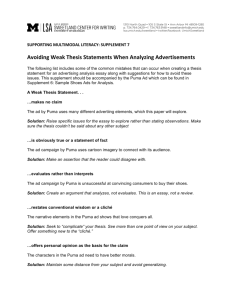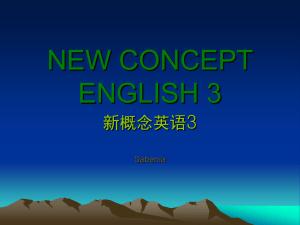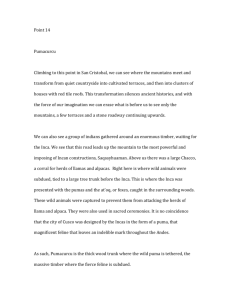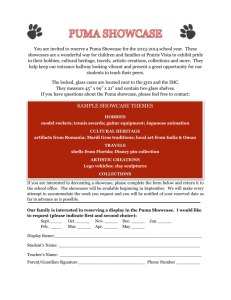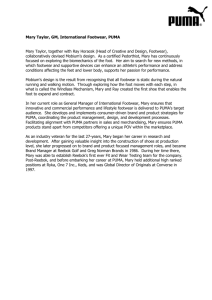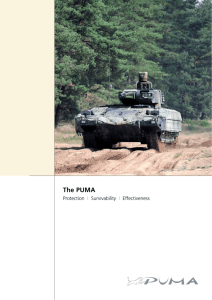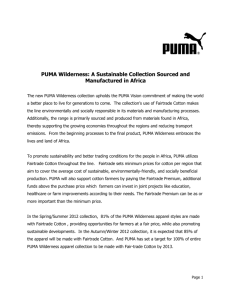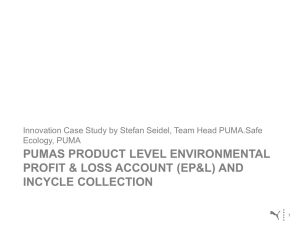annual report 2014
advertisement
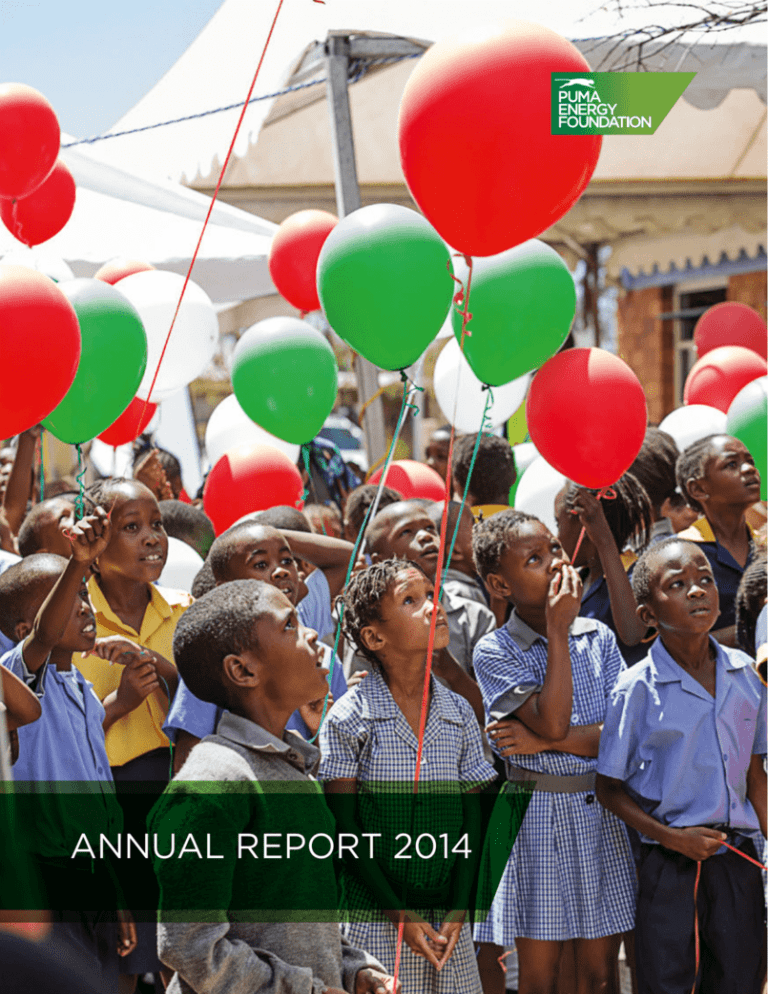
PUMA ENERGY FOUNDATION ANNUAL REPORT 2014 ANNUAL REPORT 2014 1 ‘‘ ‘‘ THE VERY NATURE OF PUMA ENERGY IS TO BE CLOSE TO PEOPLE AND SOCIETIES. FOREWORD BY GRAHAM SHARP, CHAIRMAN Our fuel storage and distribution activities make our operations visible in a fast-growing number of countries and put us literally at the doorstep of many communities. Proximity characterises the unique grass-roots profile of Puma Energy and this is why it is so important for us to ensure our commercial presence is matched with an equally strong community purpose. I am delighted that the philanthropic support we have established over the last few years was formalised in 2014, as we transformed from the Puma Energy Fund, originally embedded within the Trafigura Foundation, into a fully-fledged and distinct foundation. Our ­portfolio of projects, namely 20 programmes in Education & Vocational Training, Health & Safety, and the ­Environment, ­reflects our corporate values and our ­desire to bring about lasting change in the areas where we operate, and where we are an important employer. As we look ahead to 2015, we will add new social ­programmes to our remit that mirror Puma Energy’s swift growth in new countries, such as Australia and Myanmar for example. This local focus also enables Puma Energy staff to get involved and lend a hand. Their engagement is showcased in the following pages, and we look forward to seeing what ideas and activities they come up with next. Our selected initiatives around road safety, mobile communities, schools, health and infrastructure are implemented on the ground by reliable, efficient local partners. This delivers impactful programmes that make a real difference. I believe that we have fulfilled that purpose this year, and I am proud to share with you the fruits of our partners’ activities in this report. 1 ‘‘ ‘‘ WE ARE KEEN TO BUILD BRIDGES BETWEEN OUR PARENT COMPANY’S BUSINESS ACTIVITIES AND THE NEIGHBOURING COMMUNITIES. EDITORIAL BY VINCENT FABER, EXECUTIVE DIRECTOR We are proud to present to you the first ever Annual Report for the Puma Energy Foundation. Although ­acting for the good and welfare of the communities on our doorstep is not new to us, 2014 marked the first full year of us operating as a distinct foundation with its own identity and modus operandi. We believe we did so in a most successful way. The way our colleagues from Puma Energy embarked on this philanthropic journey with us, taking advantage of the fresh existence of the Puma Energy Foundation, has also been an inspiring experience for us. The local offices in Botswana and Namibia teamed up with road safety NGO, Amend, to make roads safer around schools. In Malawi, our staff brought essential power to a remote rural hospital by installing solar energy panels. In the Caribbean, we provided further financial aid to Caras de las Americas, a local charity with which our Puerto Rico office was already actively involved that strives to keep kids interested in education and away from the local gang and street culture. In Nicaragua, Puma Energy employees helped out at Aproquen’s ­pioneering burn camp, helping teenagers and children regain confidence after life-threatening burn injuries. As we move into 2015, we look forward to ­reinforcing the Foundation’s presence in Asia Pacific, in line with Puma Energy’s continued expansion there. We are keen to build bridges between our parent company’s business activities and the neighbouring communities, in particular the most vulnerable ones, through a strong philanthropic presence, whilst remaining mindful to retain our focus and values in every new region we enter. In Australia, which will be a new region for us, plans are already in place to establish an educational initiative serving remote Aboriginal communities. This innovative programme will provide access to culture, literacy and information, opening up new windows of equal opportunity in the areas of work and education. We are excited about what our future holds and hope you will continue to follow us there. 3 PUMA ENERGY FOUNDATION ANNUAL REPORT 2014 CONTENTS 6 8 2014 AT A GLANCE SPOTLIGHT ON STAFF AMEND, SOUTHERN AFRICA ON THE ROAD TO SAFETY AROUND SCHOOLS CARAS DE LAS AMERICAS, PUERTO RICO TEACHING THE IMPORTANCE OF SCHOOL 8 8 9 APROQUEN, NICARAGUA A BRIGHTER OUTLOOK FOR CHILDREN WITH BURN INJURIES 9 TRINITY HOSPITAL, MALAWI SAVING PATIENTS WITH SOLAR POWER OUR PROGRAMMES IN 2014 10 Americas ABRIGO, HONDURAS HOUSING AND HELP ON HOSPITAL VISITS TECHO, PARAGUAY PROVIDING HOPE THROUGH NEW HOMES 4 10 11 Africa ALIVE & KICKING, GHANA BALLS MAKING A DIFFERENCE CAMARA, ZAMBIA COMPUTERS INTO CLASSROOMS ESSOR, MOZAMBIQUE ESSENTIAL WATER AND HYGIENE FOR THE WORLD’S POOREST 11 12 12 IECD, IVORY COAST, DRC, CONGO-BRAZZAVILLE MANAGEMENT SKILLS FOR MICRO ENTREPRENEURS 13 INITIATIVE DÉVELOPPEMENT, CONGO-BRAZZAVILLE HARVESTING GROWTH AFTER CONFLICT 14 INITIATIVE DÉVELOPPEMENT, CONGO-BRAZZAVILLE A RECIPE FOR BETTER LIVING CONDITIONS INTER AIDE, MALAWI SOWING THE SEEDS OF FOOD SECURITY 14 15 INTER AIDE, MALAWI WATER AND SANITATION BRINGS RIPPLES OF CHANGE 15 INTER AIDE, MOZAMBIQUE WATER, WELLS AND WORKING TOGETHER 16 SWISSCONTACT, TANZANIA TURNING DIRT INTO GOLD NORTH STAR ALLIANCE, 12 AFRICAN COUNTRIES TAKING THE ROAD TO BETTER HEALTH MAISON DU RUGBY, SENEGAL LEARNING THE GAME OF LIFE READ TO SUCCEED, ZAMBIA READING TOOLS IN A BOX 16 17 18 18 Asia YCAB, INDONESIA YOUNG PEOPLE GET THEIR NEW BUSINESSES UP AND RUNNING CONTACT US 19 20 5 PUMA ENERGY FOUNDATION ANNUAL REPORT 2014 2014 AT A GLANCE The Puma Energy Foundation supported 20 programmes with 17 partners across 22 countries, making meaningful change in the areas of Education & Vocational Training, Health & Safety, and the Environment. AREAS OF FOCUS BY COUNTRY 1Honduras -H ealth & Safety with Abrigo 2 Puerto Rico -E ducation & Vocational Training with Caras de las Americas 3Nicaragua -H ealth & Safety with Aproquen 4Paraguay -H ealth & Safety with Techo 5Senegal -E ducation & Vocational Training with Maison du Rugby 6Gambia -H ealth & Safety with North Star Alliance 7 Ivory Coast -E ducation & Vocational Training with IECD 8Ghana -E ducation & Vocational Training with Alive & Kicking 9 Democratic Republic of Congo (DRC) -H ealth & Safety with North Star Alliance -E ducation & Vocational Training with IECD 10Uganda -H ealth & Safety with North Star Alliance 6 11Kenya -H ealth & Safety with North Star Alliance 12Congo-Brazzaville -E ducation & Vocational Training with IECD and Initiative Développement - Environment with Initiative Développement 13Tanzania -H ealth & Safety with North Star Alliance -E nvironment with Swisscontact 14Zambia -H ealth & Safety with Amend and North Star Alliance -E ducation & Vocational Training with Camara and Read to Succeed 15Malawi -H ealth & Safety with Amend, Inter Aide, and Trinity Hospital - Education & Vocational Training with Inter Aide 16Mozambique -H ealth & Safety with Amend, Essor, Inter Aide and North Star Alliance 17Namibia -H ealth & Safety with Amend 2 1 3 18Botswana - Health & Safety with Amend and North Star Alliance 19Zimbabwe -H ealth & Safety with North Star Alliance 20 South Africa -H ealth & Safety with North Star Alliance 21Swaziland -H ealth & Safety with North Star Alliance 22Indonesia -E ducation & Vocational Training with YCAB 4 Total amount donated since 2012 by the Puma Energy Fund and the Puma Energy Foundation Total amount contributed in 2014 OVER $1.5M $4.8M 5 8 6 9 7 11 10 12 13 14 22 15 16 18 17 19 20 Middle East & Asia 13.5% 21 Environment 9.5% Americas 12.5% AMOUNT INVESTED IN EACH AREA OF FOCUS AMOUNT SPENT FOR EACH REGION Africa 74% Education & Vocational Training 40% Health & Safety 50.5% 7 PUMA ENERGY FOUNDATION ANNUAL REPORT 2014 SPOTLIGHT ON STAFF Puma Energy employees get involved with local communities AMEND, SOUTHERN AFRICA ON THE ROAD TO SAFETY AROUND SCHOOLS Few people know that as well as disease, road safety ­accidents are one of the biggest killers in Africa. By working with specialised NGO, Amend, we sponsored a school road safety and prevention programme to ­reduce injuries around schools in five southern African countries. The Foundation offered tangible support in the form of reflector-enhanced schoolbags, which are proven to make roads safer, and role-plays for children to teach them safe behaviours around roads. This issue is close to our hearts and makes business sense too, due to the large amount of trucks involved in transporting Puma Energy goods. In tandem with Amend, the local Puma Energy staff in Botswana and Namibia identified high-risk areas around two schools close to the office. Together, they organised and participated in launch events to raise awareness around the issue of road safety with the media and local governments. Similar events are due to take place in Malawi, Mozambique and Zambia early in 2015, by which point the programme will have reached 15,000 school kids. TRINITY HOSPITAL, MALAWI SAVING PATIENTS WITH SOLAR POWER In early December, the Trinity Hospital in Malawi c­ elebrated the completion of the building’s new solar powered energy source, funded by the Puma Energy Foundation and installed under the supervision of our local Puma Energy office. This hospital was until recently without a power supply, creating dire conditions for the operating theatre, medical cold chain, and ­maternity care ward. The local office was highly involved in the project, sourcing suppliers and quotes, overseeing works, and carrying out technical implementation of the panels. Puma Energy attended the inauguration, ­together with representatives from the Malawi ­government. Both gave an awareness-raising presentation to the wider community around the hospital’s new services. 8 APROQUEN, NICARAGUA A BRIGHTER OUTLOOK FOR CHILDREN WITH BURN INJURIES CARAS DE LAS AMERICAS, PUERTO RICO TEACHING THE IMPORTANCE OF SCHOOL A community-based programme operating on the ­ oorstep of our industrial assets in Puerto Rico leverages d the work of local NGO, Caras de las Americas, to organise an after-school club for children aged between 5 and 12. This ‘soft’ support is vital as it helps the children deal with any later temptations of dropping out of education and becoming involved in illegal underground activities, which unfortunately, are prevalent in Puerto Rico. Originally instigated by the local Puma Energy office, the ‘Vietnam Estudia’ scheme operates in the Vietnam, Sabana and Amelia neighbourhoods in the city of San Juan, providing tutoring, extracurricular activities and emotional and psychological support. This combination of services improves young people’s capacity to graduate from high school and obtain jobs. In 2014, all students completed the school year with improved overall averages. The work of Aproquen in Nicaragua is difficult and emotional, yet rewarding. This not-for-profit organisation cares for children and teenagers who have survived life-altering burn injuries. Compelled to support ­Aproquen’s valuable – and free – service, the Puma ­Energy Foundation has helped establish a ‘burn camp’, where children who have experienced such injuries can safely share their emotions and stories in a nurturing and fun outdoor environment. Time spent at a camp like this provides a much-needed transitional space ­between leaving hospital and returning to school, where the children may face psychological, physical, and emotional issues. As the leading burn centre in Central America, Aproquen provides state-of-the-art, comprehensive care for burn injuries, and uses a holistic approach that addresses the psychological as well as physical issues of burns. It was employees from the local Puma Energy office who initially brought this ­valuable organisation to our attention, and who requested that we support the ­amazing work of Aproquen. The first burn camp – Confio en Mi (I trust in Puma Energy employees myself) – was held for ­volunteered at burn camp 33 burn survivors in ­November 2014. A team of specialists worked with the 33 adolescents to address issues of depression, anxiety and self-esteem. As a result, two out of three children were able to return to school as they realised during the camp they could feel comfortable and safe interacting with other children, and many overcame their fear of fire. 25 9 PUMA ENERGY FOUNDATION ANNUAL REPORT 2014 OUR PROGRAMMES IN 2014 AMERICAS ABRIGO, HONDURAS HOUSING AND HELP ON HOSPITAL VISITS Meaning ‘shelter’ in Spanish, the Abrigo Foundation in Honduras offers free accommodation, food and ­psychosocial support to poverty-stricken families visiting families in the country’s two main public hospitals. ­Operating in the main ­cities of Tegucigalpa and San Pedro Sula, the charity Over hosts an average 70,000 people a year and offers guests were served 200,000 free meals to in 2014 families in difficulty. Abrigo’s work provides a supportive ­environment to family members who are already experiencing ­challenging s­ ituations as they travel the country to stay with sick relatives. With help from the Puma Energy ­Foundation, Abrigo can continue providing its vital ­services in these locations. Our funding is also used for maintenance work on the homes, such as repairing electrics, ceilings, and helping with running costs. 66,000 2014 HIGHLIGHTS • T he centres saw some major improvements: – The sewage system was expanded and repaired – Kitchen facilities were repaired and painted – More computer equipment was purchased 10 AFRICA ALIVE & KICKING, GHANA BALLS MAKING A DIFFERENCE TECHO, PARAGUAY PROVIDING HOPE THROUGH NEW HOMES Life in Paraguay’s Limpio slums is hard, and particularly difficult for families at the very bottom of these marginalised communities. Techo, Spanish for ‘roof’, is a not-for-profit organisation striving to improve the living conditions of those in ­extreme poverty by providing emergency housing; simple wooden houses which a­ lleviate the mediocre ­hygiene and sanitary situation these people find themselves in. Working across three slums in Limpio, Techo partnered with the local Puma Energy staff last year, building emergency housing together. The Puma Energy ­Foundation will continue its partnership with Techo until July 2015. Thirty-eight families have already been identified to move into new homes by the summer. 2014 HIGHLIGHTS • Employees from Puma Energy’s office in ­Paraguay teamed up with 35 Techo workers to build housing in slums located near the office. The team worked over the weekend to ­assemble ten wooden houses for the most in-need families in the district. • In total, Techo built, 65 transitional houses and three ­community centres. Schools in Ghana face a shortage of sports balls due to the unavailability of quality footballs at affordable prices. Out in the broader community, Ghanaians suffer from a lack of job opportunities, especially among those who are younger or disabled. For Alive & Kicking (A&K), these two ‘lacks’ add up to one great opportunity: the creation of a stitching centre to manufacture sports balls that provides jobs and promotes health education through sport. A&K is now striving to make a significant social and economic impact across Ghana through its unique model of social enterprise. Having committed to support A&K Ghana for three years, our contribution has gone towards creating a stitching centre in the capital, Accra, which currently employs 28 people. In addition, Puma Energy has helped increase visibility of A&K’s Zambia operation, which we supported in previous years, by ­retailing balls via its network of service stations in the country. 2014 HIGHLIGHTS • A&K Ghana partnered with the Stephen Appiah Foundation (the former captain of Ghana’s national football team) to design a special ‘Tornado’ ball, with funds going towards improving the health and wellbeing of underprivileged children in Ghana. • 64 coaches, around 1,300 youngsters, and over 2,000 spectators participated in a health outreach tournament raising awareness around HIV and malaria, using 1,000 footballs printed with health messages. • UNICEF bought 3,400 balls from the Ghana stitching centre, making Q4 2014 A&K’s most successful sales season. 11 PUMA ENERGY FOUNDATION ANNUAL REPORT 2014 CAMARA, ZAMBIA COMPUTERS INTO CLASSROOMS When Irish development agency Camara puts computers into class­rooms around the world, they help break the cycle of poverty for the young generation. By gaining digital literacy skills, children can improve their educational and employment outcomes and in turn, help their families. The Puma Energy Foundation supports Camara’s eLearning centres in Africa, specifically in Lusaka and Southern Zambia, close to Puma Energy’s operations. 2014 HIGHLIGHTS • Camara delivered eLearning centres to 20 disadvantaged schools across the Lusaka area and to 20 schools in the Copperbelt and Southern Provinces areas. • 275 teachers were trained in the use of information and communication technology (ICT) in education. ESSOR, MOZAMBIQUE ESSENTIAL WATER AND HYGIENE FOR THE WORLD’S POOREST Essor, together with the Puma ­Energy Foundation, are collaborating to improve access to safe water and better hygiene in Mozambique, one of the world’s poorest countries. Beira is Mozambique’s second-largest city and home to Puma Energy industrial assets and we are eager to help improve living standards there. In r­ ecent years, Beira has seen rapid, uncontrolled growth, and this has contributed to the worsening c­ onditions. The scope of our partnership with Essor e­ xtends to 3,000 families and will bring them quality water, a healthier environment, and help them acquire better hygiene practices. To-date, Essor has sensitised more than 58,000 people around good hygiene, which will help prevent serious illnesses such as diarrhoea (a cause of infant mortality), and cholera. 2014 HIGHLIGHTS • Over 1,000 youth and adults in the community were sensitised to health and hygiene issues. • Close to 100 new latrines were built for as many families. 12 2014 HIGHLIGHTS • A new Management Training Centre opened in ­Congo-Brazzaville. • 750 people took part in management training courses. • A National Entrepreneurs Day was launched across the Ivory Coast. IECD, IVORY COAST, DRC, CONGO-BRAZZAVILLE MANAGEMENT SKILLS FOR MICRO-ENTREPRENEURS The Puma Energy Foundation is pleased to partner with the European Institute for Cooperation and ­Development (IECD) to improve the living conditions and prospects of micro- and small entrepreneurs in the Management Ivory Coast, DRC and training course Congo-­Brazzaville. In the participants were region, very small businesses account for 75% of female jobs, so it is essential that these structures flourish and overcome their main stumbling block to growth, namely a lack of management skills. By removing the barriers to better business, these small enterprises can continue making big contributions to the local economy. In 2014, seven Management Training Centres were operational across the three countries. 30% 13 PUMA ENERGY FOUNDATION ANNUAL REPORT 2014 INITIATIVE DÉVELOPPEMENT, CONGO-BRAZZAVILLE HARVESTING GROWTH AFTER CONFLICT In the Louingui District of Congo-Brazzaville, the Puma Energy Foundation supports the work of French NGO, Initiative Développement (ID), which aims to improve people’s living conditions and identify areas of development in the economic sectors of the region, together with the local communities and government. ID supports peasant organisations (representing around 500 farmers and producers) to identify and provide services that they can sell and encourage them to develop activities for the benefit of their members and local communities. 2014 HIGHLIGHTS • Two women’s associations were created and officially recognised by local authorities. • Rural tracks were ­restored by the local population, in partnership with authorities, and are currently well maintained. • Three local development committees were created. INITIATIVE DÉVELOPPEMENT, CONGO-BRAZZAVILLE A RECIPE FOR BETTER LIVING CONDITIONS The Puma Energy Foundation supports a ‘cook stoves’ programme in Congo-Brazzaville. The use of wood and charcoal for cooking in Brazzaville is very common, yet the stoves used are inefficient and require a lot of fuel to operate. Plus, cooking in this way requires large amounts of wood and charcoal, which is not only costly, but a major cause of deforestation. Initiative Développement (ID) is seeking to reduce the pressure on wood resources in the area and improve the efficiency of wood fuel in the home and for professional use. ID is supporting the ­creation of a local network of craftsmen and resellers who will produce and distribute improved wood-saving stoves, over a two-year period. The project is in its early stages but marketing plans and quality guidelines for the stoves have already been drafted. 2014 HIGHLIGHTS • More than 1,000 improved stoves were sold. • Six craftsmen are now producing stoves for the local market. • Beneficiaries reduced their wood consumption by 50%, and their charcoal consumption by 30%. 14 INTER AIDE, MALAWI SOWING THE SEEDS OF FOOD SECURITY INTER AIDE, MALAWI WATER AND SANITATION BRINGS RIPPLES OF CHANGE In the southern district of Phalombe, Malawi, communities rely on working the land for their living. The Puma Energy Foundation is contributing to an initiative by Inter Aide to improve food security and the ­livelihoods of these communities. This is a largeof beneficiary scale project, destined to farmers are aware reach 16,000 beneficiaries of soil and water and is based on a particiconservation pative approach. Heads m ­ easures of families are trained in how to improve crop ­production, irrigation, livestock management and m ­ arketing. Many families are being encouraged to move into tree production to help them d ­ iversify their crop production. One of Puma Energy’s ­operational centres is ­located in the heart of Southern Malawi. The Puma Energy Foundation, alongside Inter Aide, is supporting a wide-reaching project that seeks to ­improve access to safe water in the area of ­Phalombe and to offer long-term protection of water facilities in three other districts. By the end of the project period in 2016, 1,250,000 well-users will be empowered to own and manage the maintenance services that come with them, whilst 750,000 users will regain access to safe water. 100% 2014 HIGHLIGHTS • More than 800 new beneficiaries started tree production. • 20 seed banks were created and 644 families used the ‘loan in kind’ scheme. • 250 new beneficiaries were trained in irrigation to help improve crop yields during the dry season. 2014 HIGHLIGHTS • Nine more protected water points were built or rehabilitated, providing access to drinking water to close to 2,500 persons. • A total of 1,760 family latrines were constructed, of which 464 were ‘ecological latrines’, benefiting 8,800 people. • 1,000 people attended best hygiene practice workshops and ­completed a hygiene ­practices training cycle. 15 PUMA ENERGY FOUNDATION ANNUAL REPORT 2014 INTER AIDE, MOZAMBIQUE WATER, WELLS AND WORKING TOGETHER In Mozambique’s Nampula Province, Inter Aide is ­helping people access better water, health and sanitation. The Puma Energy ­Foundation is supporting them in this valuable work. The programme is three-fold: to improve h ­ ygiene practices at a family level, to build or repair protected water-­ Over points (wells), and to build people family latrines. The work trained in hygiene is strengthened by the practices, of which ­involvement of village children committees and a main­ tenance network that ­employs local repairmen and spare-parts retailers. This third pillar of the ­programme, which creates employment and fosters sustainability, is the key to establishing a thriving, self-sustaining community that can journey to a better, healthier life. 2,000 650 2014 HIGHLIGHTS • 13 protected water-points were built, improving access to drinking water for 5,200 beneficiaries. • 90% of families were equipped with a latrine. • Area mechanics repaired 105 protected water-points in Nacala District, providing safe water to 42,000 people. SWISSCONTACT, TANZANIA TURNING DIRT INTO GOLD The Puma Energy ­Foundation has teamed up with Swiss NGO, of trainees Swisscontact, to generate were women employment for young Tanzanians through new economic oppor­tunities. In Tanzania’s Morogoro region, where youth unemployment is high, young people are being o ­ rientated ­towards an innovative new scheme of waste management and r­ ecycling. The project offers skills development in two areas, agriculture and sustainable waste management, where the transformation of organic waste makes for an eco-friendly fertilizer for agricultural activities. So far, the results include improved welfare, less ­environmental degradation and reduced health risks for the population. Over the long term, the project should i­ mpact 1,500 small farmers, 1,500 unemployed rural youths and 200 staff members of community-­ based organisations. More than 40% 2014 HIGHLIGHTS • Over 1,200 farmers and youth were trained in sustainable agriculture practices. • 77% of trained youth are self-employed in agriculture. • 61 community-based organisations (almost 50% women) were trained in waste management and are now fully ­employed with a regular salary. • Morogoro municipality is now officially cleaner, and gained third position at national level in the Tanzania ­Municipals Cleanliness Competition. 16 NORTH STAR ALLIANCE, 12 AFRICAN COUNTRIES TAKING THE ROAD TO BETTER HEALTH Across Africa, truck drivers are particularly vulnerable to health problems. On the road for months at a time, it is hard for them to have regular medical check-ups, they are likely to fall ill far from home, and tend to have ­unprotected relations. Within this mobile community, sexually transmitted diseases are prevalent and are spread by drivers who may not be aware of the health risks and impli­cations of these diseases. North Star ­A lliance ­provides health and sexual education services specifically for this marginalised group and the ­surrounding community. It also disseminates road safety education and training to truck drivers to ­increase road safety. This wide-reaching project has seen North Star Alliance open 34 roadside clinics along Africa’s main transport corridors, spanning 12 countries, mainly in southern Africa. 2014 HIGHLIGHTS • Support was given during the Ebola crisis in the form of kits and cleaning liquids distributed across the network. • 3,500 truckers and 1,000 road freight operators received health and safety tools on topics ranging from ‘Health on the Road’ to ‘Defensive Driving’; 60% reported they had learned something new. 17 PUMA ENERGY FOUNDATION ANNUAL REPORT 2014 READ TO SUCCEED, ZAMBIA READING TOOLS IN A BOX MAISON DU RUGBY, SENEGAL LEARNING THE GAME OF LIFE The world of sport is a valuable terrain in which to learn the values of discipline, teamwork, respect and ambition. In Yoff, a district in the city of Dakar, many families are struggling or jobless, while children fall out of school and often have no one to take care of them. Rather like a second home, Maison du Rugby welcomes around 200 children aged 7 to 17 and offers a variety of free ­educational and sports activities. Here, the warm ­environment goes a long way to preventing young kids from becoming victims or perpetrators of violence and street crime. Educators coordinate with parents and schools to help re-enroll the children. Activities include help with homework, computer science, theatre, pottery, and civics and hygiene awareness. The primary focus however is rugby, which takes up 4.5 hours a week and is taught to girls and boys alike. 2014 HIGHLIGHTS • 617 children aged 7 to 17 enrolled in the centre, of which 45% were girls. • 276 after-school courses were organised. • The Senegalese authorities chose Maison du Rugby to ­celebrate the very first International Sports Day for ­Development and Peace. 18 Read to Succeed is part of 2014 HIGHLIGHTS an alliance with USAID • The Puma Energy that brings together a Foundation joined a unique mix of partners, regional alliance assets, and competencies ­offering supplementary aimed at improving reading reading materials to skills and academic scores 170 schools in Zambia. among children in primary schools in Zambia. The ‘Reading Tools in a Box’ concept provides primary school teachers with ­low-cost materials and reading aids that they can use to teach their pupils to read. Teachers will be trained to use the materials in the classroom and receive follow-up ­monitoring and support. The toolbox will also include key information on road and fuel safety. ASIA YCAB, INDONESIA YOUNG PEOPLE GET THEIR NEW BUSINESSES UP AND RUNNING Across Indonesia, YCAB strives to help local youths start new businesses. In partnership with the Puma ­Energy Foundation, YCAB is focusing on the areas in and around Puma Energy’s operational centres in ­Cilincing (Northern Jakarta), Musi II (Palembang), ­Samarinda (Central Kalimantan), Tangerang (Banten) and Bekasi (West Java). YCAB builds up young people from underprivileged families by teaching them vocational, employable skills with an entrepreneurial edge. Participants are encouraged to create a simple, viable business plan and are then challenged to compete in a pitch to obtain seed capital for their start-ups. The seed capital is awarded to the top three business proposals. 2014 HIGHLIGHTS • The first set of vocational training sessions took place. • In Palembang, 30 students chose to train in beauty, and in Samarinda, 24 chose mechanics. • The first group of students have already graduated from the vocational scheme, and received YCAB Foundation certificates, which are recognised by the local government. 19 PUMA ENERGY FOUNDATION ANNUAL REPORT 2014 WE ARE THE PUMA ENERGY FOUNDATION COME AND TALK TO US If you’ve got any questions about the Puma Energy Foundation, or would simply like to find out more about our work, please email contact@pumaenergyfoundation.org, or call +41 22 594 6947. We look forward to hearing from you. Puma Energy Foundation 1, rue de Jargonnant CH-1207 Geneva Switzerland pumaenergyfoundation.org Photo credits: Sala Lewis (cover, p.2, p.8, p.21); Jonathan Glynn-Smith (inside front cover, pp.4-5, p.19); Dave Chidley (p.17); Sylvain Cherkaoui (p.18). Thank you to all those who provided photography for this brochure. Design: Théorème Communication, Geneva Copy and editing: CONTEXT, Geneva Printed by Atar Roto Presse, Geneva Printed on Balance Pure 100% recycled paper. Balance Pure is Forest Stewardship Council (FSC) ­certified, meaning that it is made with, or contains, pulp from well-managed forests. It is also chlorine-free. 20
